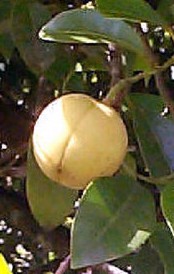 Nutmeg (Myristica fragrans) is a small evergreen tree growing up to 43 feet native to Blanda islands that are part of the Moluccas, or Spice islands, of Indonesia. It has dark green leaves two to six inches long and male and female flowers on different plants. The pale yellow flowers are bell-shaped, waxy, and fleshy. Male flowers are carried in groups of one to ten while female flowers are in groups of one to three. The fruits are oval or pear-shaped, 2.4-3.5 inches long, and have a fleshy husk enclosing a purple-brown seed with a red covering. Nutmeg comes from the seed while mace comes from the red covering.
Nutmeg (Myristica fragrans) is a small evergreen tree growing up to 43 feet native to Blanda islands that are part of the Moluccas, or Spice islands, of Indonesia. It has dark green leaves two to six inches long and male and female flowers on different plants. The pale yellow flowers are bell-shaped, waxy, and fleshy. Male flowers are carried in groups of one to ten while female flowers are in groups of one to three. The fruits are oval or pear-shaped, 2.4-3.5 inches long, and have a fleshy husk enclosing a purple-brown seed with a red covering. Nutmeg comes from the seed while mace comes from the red covering.
Shakespeare refers to nutmeg in three plays.
1. Dauphin in Henry V (act iii, sc. 7, 20) the Duke of Orleans comments on the horse of the Dauphin, son of the French king, Charles VI;
He’s the color of nutmeg
2. The clown in Winter’s Tale (act iv, sc. 3, 50) goes over his grocery list as he prepares to shop for the sheep –shearing feast;
I must have saffron to colour the warden
pies; mace; dates?—none, that’s out of my note;
nutmegs, seven;
3. In Love’s Labour’s Lost (act v, sc. 2, 650) the Spanaird,Armado, and the lord Dumain speak about Hector;
Armando: The armipotent Mars, of lances the almighty,
Gave Hector a gift-
Dumain: a gilt Nutmeg.
Nutmeg may have been the spice that the ancient Roman naturalist Pliny the Elder mentioned when he wrote about a tree bearing nuts with two flavors. The Arabs introduced nutmeg into Constantinople in the middle ages, from whence the Venetian traders brought it to Europe. Nutmeg was valued then for its medicinal and culinary virtues and in Elizabethan times it was thought to ward off the bubonic plague. John Gerard, the botanist and contemporary of Shakespeare wrote about it although he was probably not familiar with the tree because it was not introduced into England for another 200 years after he wrote.
The common name, nutmeg, comes from the Latin nux meaning nut, and late Latin mucadata meaning musky. The generic name Myristica comes from the Greek myristidos meaning fit for anointing and the specific name, fragrans, comes from the Latin fragro, to smell.